
JOURNAL OF BAND RESEARCH
Scope & Guideline
Celebrating the Evolution of Band Literature
Introduction
Aims and Scopes
- Empirical Research in Wind Bands:
The journal publishes studies that collect and analyze data related to wind band performance, pedagogy, and conductorship, thereby contributing to the evidence-based practice within the field. - Pedagogical Strategies and Insights:
A significant focus of the journal is on teaching methodologies, including aural skills and the perceptions of conductors, aimed at improving educational practices in wind band settings. - Historical and Analytical Studies:
The journal includes articles that explore the historical context and formal analysis of compositions for wind bands, offering insights into the evolution of wind band music. - Conducting Practices and Musician Experience:
Research that examines the interaction between conductors and musicians, including factors that affect enjoyment and performance, is a key area of interest.
Trending and Emerging
- Impact of Conducting on Musician Experience:
Research focusing on the behaviors and techniques of conductors, particularly how these influence musician enjoyment and engagement, has gained traction, emphasizing the importance of interpersonal dynamics in music education. - Innovative Pedagogy for Wind Bands:
There is a growing emphasis on innovative teaching strategies, such as the role of autonomous chamber music in fostering creativity among band students, showcasing a shift towards more interactive and student-centered learning approaches. - Analysis of Performance Metrics:
Increasing attention is being given to the quantitative assessment of performance, such as the relationship between band size and performance ratings, reflecting a trend towards data-driven evaluations in educational contexts. - Survey Research on Conductors' Perceptions:
The use of surveys to gather insights from conductors about pedagogical strategies and challenges is emerging as a valuable method for understanding the field's current landscape.
Declining or Waning
- Historical Context of Specific Compositions:
While historical analysis remains important, there appears to be a waning interest in detailed composer-specific studies, such as those focusing solely on individual works or composers without broader implications for the wind band repertoire. - Performance Anxiety in High School Musicians:
Although performance anxiety has been a critical topic, its coverage has decreased, suggesting a shift in focus towards more immediate pedagogical strategies rather than psychological aspects. - Integration of Diverse Band Festivals:
The exploration of integrated band festival effects, particularly concerning racial dynamics, has seen less frequency, indicating a potential shift away from sociocultural analyses in favor of more technical or pedagogical discussions.
Similar Journals
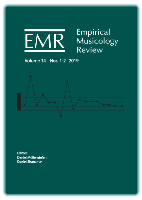
Empirical Musicology Review
Empowering Scholars to Transform Music Research with Open AccessEmpirical Musicology Review is a pioneering journal in the field of musicology, published by the Ohio State University School of Music. Established as an open access journal since 2006, it aims to foster interdisciplinary research by providing a platform for scholars to disseminate empirical studies and analyses related to music. With ISSN 1559-5749, this journal plays a crucial role in expanding the understanding of music through methodological rigor and innovative practices, catering to researchers, professionals, and students alike. By promoting the accessibility of high-quality research, Empirical Musicology Review significantly contributes to the evolving landscape of music studies and enhances the global dialogue surrounding music's theoretical and practical dimensions. The journal's commitment to open access ensures that its valuable insights reach a broad audience, encouraging further exploration and collaboration within the musicology community.
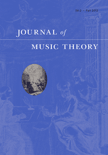
JOURNAL OF MUSIC THEORY
Advancing Knowledge in Musical AnalysisJOURNAL OF MUSIC THEORY is a prestigious academic journal published by DUKE UNIVERSITY PRESS, dedicated to the rigorous exploration of music theory, analysis, and related fields. With an ISSN of 0022-2909 and an E-ISSN of 1941-7497, this journal has gained significant recognition for its scholarly contributions, evidenced by its ranking in the first quartile (Q1) in the field of Music as per the 2023 Category Quartiles. With an impressive position of #33 out of 180 in the Scopus Ranks for Arts and Humanities in Music and standing at the 81st percentile, it is an essential resource for both aspiring and established researchers, professionals, and students. Offering a platform for innovative research from 2002 to 2024, the journal aims to foster a deeper understanding of the complexities of music in contemporary discourse, making it an invaluable tool for anyone invested in the theoretical underpinnings of music.

Musicologist
Advancing Music Knowledge Through Innovative ResearchMusicologist is a premier academic journal dedicated to the exploration and analysis of music theory, history, and practice, published by the esteemed Trabzon University State Conservatory in Turkey. With an ISSN of 2618-5652, this journal has been a vital platform for scholars since its inception in 2019, reflecting a commitment to fostering innovative research in the field of music. Recognized for its quality, the journal currently holds a Q2 ranking in the music category for 2023, placing it within the top segments of its discipline, as evidenced by its position at #72 out of 180 in the Scopus rankings, representing the 60th percentile. Although the journal employs a traditional publication model, it serves as a crucial repository for contemporary musicological discourse, aiming to advance knowledge and understanding within a vibrant academic community. Musicologist is not only a resource for seasoned researchers but also an invaluable tool for students and professionals alike, nurturing a comprehensive appreciation of music as an art form and scholarly pursuit.

Musica Hodie
Exploring the Harmony of Knowledge in Music StudiesMusica Hodie is a pivotal academic journal published by the Universidade Federal de Goiás, Brazil, focusing on the field of music. The journal, with ISSN 1676-3939 and E-ISSN 2317-6776, serves as a vital platform for scholars, professionals, and students to disseminate innovative research findings and critical analyses related to music theory, history, and practice. With a prestigious Q2 ranking in the Music category and a Scopus rank of 103/180, the journal significantly contributes to the cultural and academic landscape of music studies in Brazil and beyond, covering converged years from 2010 to 2016 and also from 2018 to 2023. Although it operates under a subscription model, the journal remains committed to fostering open dialogue and knowledge sharing in the arts and humanities. As researchers delve into the intricacies of music, Musica Hodie stands out as a key resource for advancing scholarly discourse and enhancing the understanding of music’s multifaceted role in society.
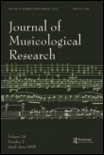
JOURNAL OF MUSICOLOGICAL RESEARCH
Contributing to the Evolution of Musicological DiscourseJOURNAL OF MUSICOLOGICAL RESEARCH, published by Taylor & Francis Ltd, is an esteemed platform that delves into the field of musicology, contributing to the ongoing dialogue in music research and scholarship since its establishment in 1979. With an ISSN of 0141-1896 and an E-ISSN of 1547-7304, this journal serves as a vital resource for researchers, professionals, and students, offering insights into diverse musicological topics. Although currently categorized in Q4 in Music with Scopus rankings placing it at #110 out of 180 in the Arts and Humanities field, its commitment to excellence and broader discourses in music studies is evident. The journal does not have Open Access options, yet it provides accessible content through reputable academic channels, fostering scholarly exchanges within the community. It aims to publish high-quality research that advances understanding of musical practices and cultural implications, making it a critical resource for those passionate about music and its myriad influences.

MUSIK UND KIRCHE
Bridging Sacred Melodies and Spiritual InsightsMUSIK UND KIRCHE is a distinguished journal published by BARENREITER-VERLAG that offers a scholarly platform for the exploration of the intersections between music and ecclesiastical contexts. With an ISSN of 0027-4771 and an E-ISSN of 2568-3128, this journal is particularly valuable for researchers, practitioners, and students engaged in musicology, religious studies, and cultural history. Although currently not open access, it provides a wealth of peer-reviewed articles that enhance understanding of music's role within church tradition and practice, thereby contributing significantly to the field. Despite fluctuating visibility in academic rankings—standing in Q4 of the 2023 category for Music, based on Scopus evaluations—its historical coverage from 2002 to 2012 and resumed publication since 2020 demonstrates its commitment to fostering rigorous academic discourse. The journal is based in Kassel, Germany, and serves as an essential resource for anyone interested in the dynamic relationship between music and spiritual life.
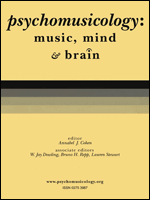
Psychomusicology
Unlocking the Psychological Power of SoundPsychomusicology is a premier journal dedicated to the interdisciplinary exploration of the intersection between psychology and music. Published by the American Psychological Association, this esteemed publication serves as a vital resource for researchers, professionals, and students keen on understanding the profound impact of music on human cognition, emotion, and behavior. With a commitment to publishing high-quality research, Psychomusicology offers insights into diverse topics ranging from music perception and performance to the therapeutic applications of music. By fostering a community of scholars interested in the psychological aspects of music, the journal aims to advance empirical research and stimulate innovative thinking in the field. The ISSN for print is 0275-3987, while the electronic version can be accessed under E-ISSN 2162-1535. Unfortunately, the journal currently does not offer Open Access options, but it remains an essential reference for those engaged in the psychological and musical disciplines, promoting an enriched understanding of how music shapes the human experience.

Malaysian Journal of Music
Diving Deep into the Heart of Malaysian MusicThe Malaysian Journal of Music is a distinguished academic publication dedicated to the exploration and advancement of music and cultural studies within the Southeast Asian context. Published by UNIV PENDIDIKAN SULTAN IDRIS, FACULTY OF MUSIC & PERFORMING ARTS, this journal contributes significantly to the field by disseminating high-quality research and scholarship related to both traditional and contemporary music practices in Malaysia and beyond. Since its inception in 2018, the journal has earned a Q3 categorization in both Cultural Studies and Music, reflecting its commitment to fostering a comprehensive understanding of these interdisciplinary areas. As of now, it ranks 90th out of 180 in the domain of Arts and Humanities focused on Music, positioning it firmly within the academic discourse. The Malaysian Journal of Music serves as an invaluable resource for researchers, professionals, and students alike, providing insights into the rich tapestry of music, culture, and their societal impacts. The journal is dedicated to open access publishing, ensuring that knowledge is shared widely and freely, further solidifying its role as a cornerstone for music scholarship in Malaysia.
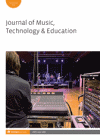
Journal of Music Technology & Education
Transforming education through the power of music technology.Welcome to the Journal of Music Technology & Education, a leading academic journal dedicated to the intersection of music, technology, and pedagogical practices. Published by INTELLECT LTD in the United Kingdom, this journal has gained considerable recognition within the scholarly community, particularly noted for its strong rankings across multiple disciplines. As of 2023, it holds a prestigious Q1 quartile position in Music, Q2 in Education, and Q3 in Computer Science Applications, highlighting its multifaceted impact on various fields. Spanning over a decade from 2012 to 2023, the journal features rigorous peer-reviewed articles that explore innovative approaches to music education, technology integration in teaching practices, and advancements in digital music creation. Researchers, educators, and students alike will find valuable insights and cutting-edge research to keep them at the forefront of this rapidly evolving landscape. Access to the journal's content is available to a broad audience, making it a vital resource for anyone interested in the vibrant world of music technology.

INTERNATIONAL REVIEW OF THE AESTHETICS AND SOCIOLOGY OF MUSIC
Connecting Cultures Through the Lens of MusicThe INTERNATIONAL REVIEW OF THE AESTHETICS AND SOCIOLOGY OF MUSIC, published by the Croatian Musicological Society, is a pivotal scholarly journal dedicated to the intricate intersection of music, aesthetics, and sociology. With a special focus on exploring the cultural and social dimensions of music, this journal serves as a platform for researchers, professionals, and students alike to disseminate innovative ideas and transformative research. Although it operates under a traditional access model, the journal's impact within the field of music studies is underscored by its commendable Scopus ranking in the Q3 category and its established history from 2009 to 2016, with a renewed focus from 2018 to 2023. With an ISSN of 0351-5796, it continues to shape academic discourse with its insightful contributions and is essential for those aiming to engage deeply with the evolving dynamics of music in society.